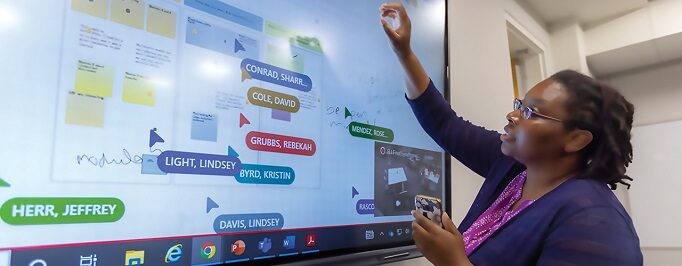Impacting student success
By Allegra Davis Hanna and Michelle York
February 2, 2023
Inside a Texas college’s faculty-driven Engaged Learning Institute
When we think of what college classrooms look and sound like, we first might imagine the way movies portray them: esteemed professors lecturing to row after row of students in a large, stadium-style hall.
It’s different Tarrant County College (TCC). At the Texas college, the focus is a method of education in which students actively demonstrate their understanding and proficiency in the subject. While brief lectures can be a critical component of effective instruction, faculty who participate in TCC’s Engaged Learning Institute (ELI) recognize and implement dozens of additional instructional strategies that empower students to better understand and apply knowledge and skills learned in the classroom.
ELI is a cohort-based faculty development program designed, managed and facilitated by TCC faculty. It promotes the transformation of learning beyond the traditional classroom to create experiential and engaged learning with relevant technology in a fluid and flexible environment. This facilitates connections students need to make in order to apply what they learn, so that they can be successful in a global work environment. ELI leads faculty through professional training on topics such as creating learning communities in class, civic engagement, culturally responsive teaching, cultivating more active student learning and research on proven techniques.
“Many of the best practices and current research explored in ELI influence changes in my teaching,” said TCC Connect biology instructor and ELI facilitator Natalie Russell. “For example, I am focused on chunking material into smaller, digestible pieces, with many opportunities to practice sprinkled in.”
ELI also provides an opportunity for faculty to reflect on and continually improve their own practices to enhance student success.
“ELI has made me think deeper about the design of the classes I teach and given me tools to use in improving materials,” explained Kimberley Cox, associate professor of government, also for TCC Connect. “ELI has made me focus more on how I can better engage and assess students.”
Truly engaging students in learning means creating and delivering lessons that involve students as active participants, connecting the material to their own lives and understanding how the coursework prepares them for their future careers.
Russell added, “I previously put much of the burden of student learning on creating the best presentation or video. I have realized that student learning is more about giving students different opportunities and a variety of options to engage in the lesson content.”
In addition to new methods of instruction, ELI has also led to innovations in the design of assignments.
“I have incorporated assignments that give students a choice about how they show proficiency. To explain a concept, they can create a presentation, an audio recording, a video, an essay or an infographic,” Russell said.
“Since ELI, I’ve added more assignments that allow students to reflect on how their backgrounds have shaped them,” noted Mel Kenfield, TCC Connect instructor of sociology. “This allows them to bring themselves fully into the classroom, connecting their individual experiences with the academic material we’re covering.”
This effort makes a significant difference for students. In an end-of-course evaluation for a class taught by a graduate of the ELI, one student said: “It surprised me to find that the assignment applied to my professional life. I could take a scenario from the real world and turn it into a polished proposal for my final assignment. This is a proposal that I can take to my supervisor and colleagues, and my ideas will be taken seriously.”
Another important benefit of ELI is its inclusion of a study of accessibility and implementation of Universal Design for Learning (UDL). As a result, instructional materials and practices are intentionally made to be universally accessible.
“I now have the awareness in place to figure out how to quickly adapt and restructure the lesson to fit my students’ needs,” stated Jerrica Jordan, professor of English at TCC Trinity River.
“ELI has reminded me that not everyone learns the same way,” Savant said. “My experience in the ELI program has made me more conscientious in my planning.”
To date, nearly 350 faculty have completed engaged learning professional development.
There’s more to the story! Read the full article here.




